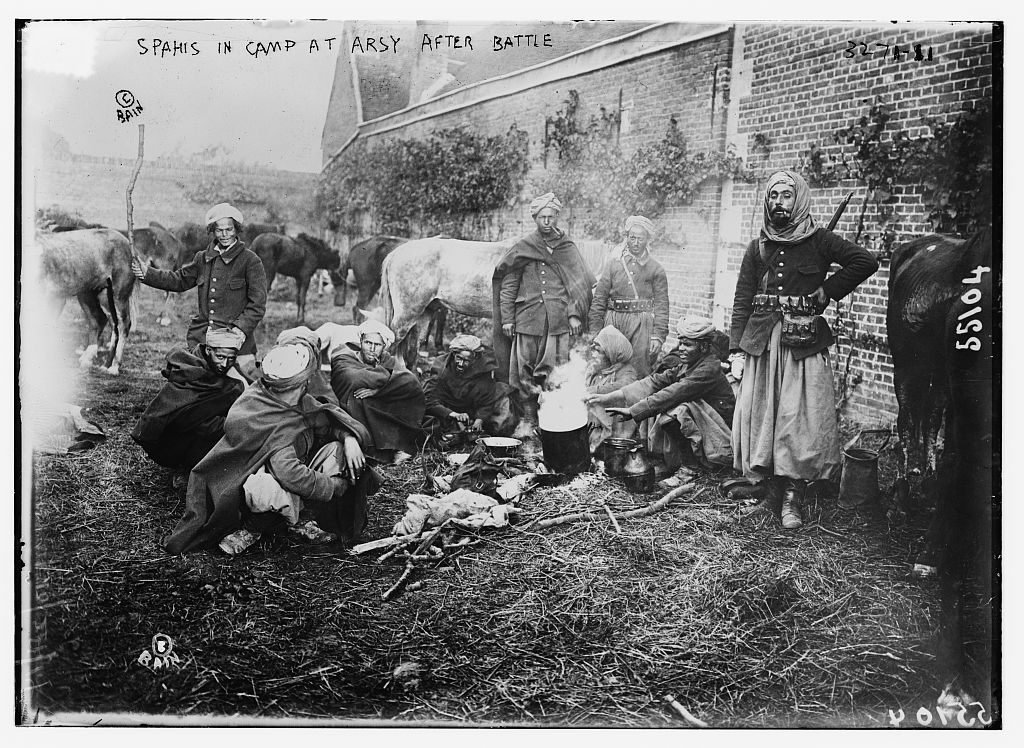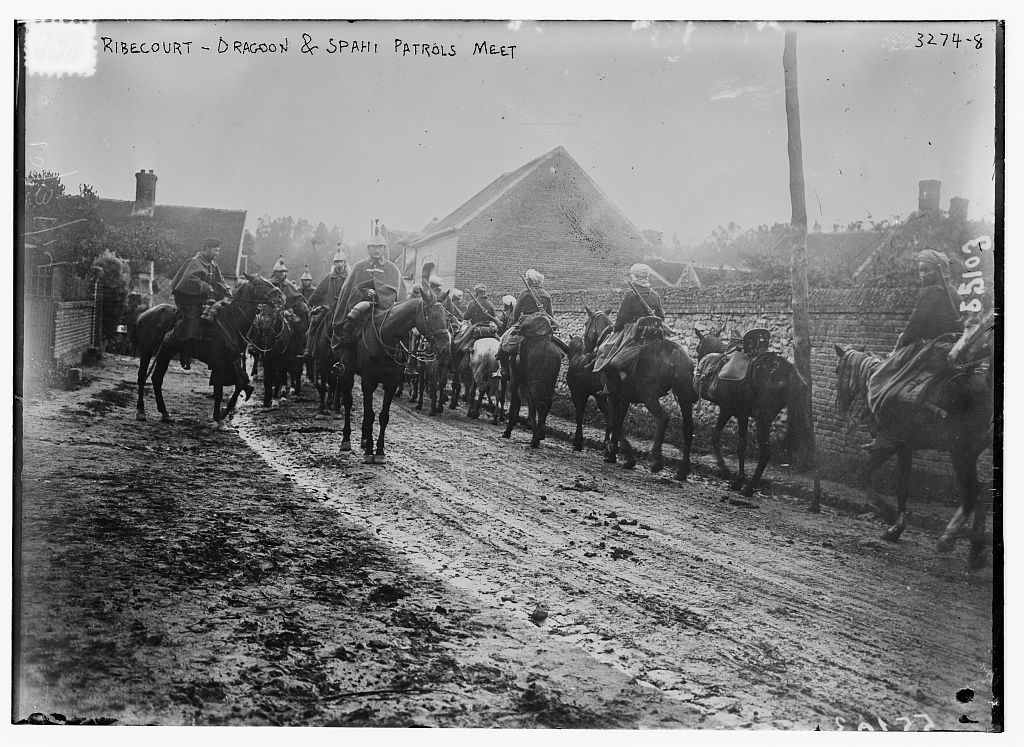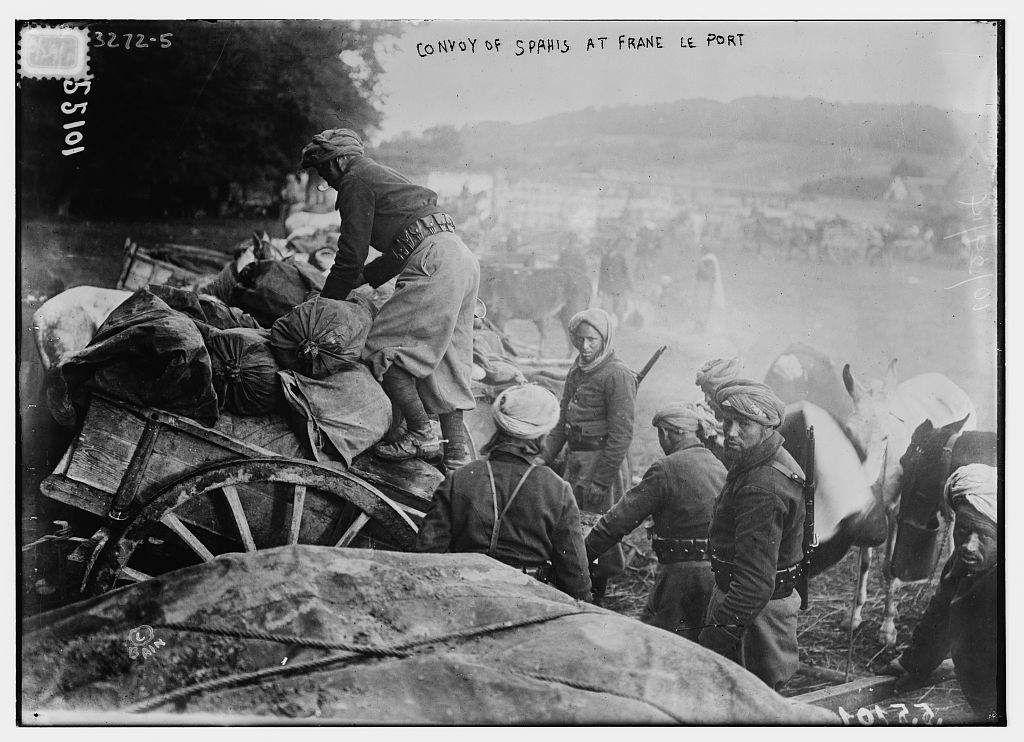Page 1 of 1
Spahis, World War One.
Posted: Thu Aug 30, 2012 12:24 pm
by Pat Holscher

Ban news service, public domain photo.
Re: Spahis, World War One.
Posted: Thu Aug 30, 2012 12:28 pm
by Pat Holscher
Re: Spahis, World War One.
Posted: Thu Aug 30, 2012 12:28 pm
by Pat Holscher
Re: Spahis, World War One.
Posted: Fri Aug 31, 2012 5:53 pm
by Couvi
Interesting saddle on that led horse in the second photograph.
Re: Spahis, World War One.
Posted: Sun Sep 02, 2012 1:30 pm
by John M Φ
Surely that's a stand Spahi saddle. Interesting photos, Pat.
Re: Spahis, World War One.
Posted: Sun Sep 02, 2012 1:31 pm
by John M Φ
...."standard !...
Re: Spahis, World War One.
Posted: Sun Sep 02, 2012 2:18 pm
by Centman
If you look at pictures of Morocan horsemen, the ones that do the charge and firing of muzzle loaders for tourists, you will see that it is a traditional North African design, ideal for fighting from.Quick thought, as the Moors came from North Africa and invaded Spain, could this have been the early influence of the Spanish Saddle?
Very informative Wikipedia doc about Spahis, of whom I had never heard, but watching the inaguration of President Holland, this year the uniform as worn by the Foreign Legion was very evident.
Re: Spahis, World War One.
Posted: Sun Sep 02, 2012 9:03 pm
by Pat Holscher
Couvi wrote:Interesting saddle on that led horse in the second photograph.
Note the very high pommels and cantels.
Re: Spahis, World War One.
Posted: Fri Sep 07, 2012 3:40 pm
by dekenai
From April 1918 the Regt Mixte de Marche de Cavalarie (FR), which composed of Spahis and Chasseurs d'afrique, fought in Palestine under BRGEN MacArthur-Onslow, 5 Australian Lighthorse Brigade.
They replaced the 1/1 Warwick Yeomanry, sent back to France to exploit the last 100 days of the war.
Re: Spahis, World War One.
Posted: Fri Sep 07, 2012 7:23 pm
by Pat Holscher
dekenai wrote:From April 1918 the Regt Mixte de Marche de Cavalarie (FR), which composed of Spahis and Chasseurs d'afrique, fought in Palestine under BRGEN MacArthur-Onslow, 5 Australian Lighthorse Brigade.
They replaced the 1/1 Warwick Yeomanry, sent back to France to exploit the last 100 days of the war.
I wonder how many Spahis and African cavalry fought in France?
Re: Spahis, World War One.
Posted: Fri Sep 14, 2012 9:51 am
by Joseph Sullivan
Those guys look like Bashi Bazouks to me. I wonder really, how much difference there was other than the more irregular nature of the Bashi Bazouks?
Re: Spahis, World War One.
Posted: Tue Jan 22, 2013 7:49 am
by PIIRTOPOIKA
In the WWII the Spahi's were fighting with the cadet's of the school of Equitation of Saumur in the Loire region in France against the German Wehrmacht. There are pictures of captured Berber horses in the book of Klaus Ricter - Kavallerie der Wehrmacht Podzen-Pallas Verlag GmbH.ISBN 2345 4321.
Most of those horses were taken back to Berlin and retrained at the cavalryschool at Krampnitz by Felix Bürkner. They made a quadrille of those horse with 12 riders. Most of the horses that were not suitable for rtraining were send with differnt regimnets towards the Eastfront ( Operation Barabarossa) to fight againt the Russians
Re: Spahis, World War One.
Posted: Wed Jan 23, 2013 7:19 am
by Pat Holscher
PIIRTOPOIKA wrote:In the WWII the Spahi's were fighting with the cadet's of the school of Equitation of Saumur in the Loire region in France against the German Wehrmacht. There are pictures of captured Berber horses in the book of Klaus Ricter - Kavallerie der Wehrmacht Podzen-Pallas Verlag GmbH.ISBN 2345 4321.
Most of those horses were taken back to Berlin and retrained at the cavalryschool at Krampnitz by Felix Bürkner. They made a quadrille of those horse with 12 riders. Most of the horses that were not suitable for rtraining were send with differnt regimnets towards the Eastfront ( Operation Barabarossa) to fight againt the Russians
Very interesting. I was completely unaware of that.
I know that French North African troops were at least partially mounted as late as the campaign in Italy late war, but there tends to be little said or written about that. We've touched on it a little here, but that might be interesting to explore.
Re: Spahis, World War One.
Posted: Fri Jan 25, 2013 4:40 pm
by Sam Cox
The Goumiers from Morroco had mounted troops in ww2
Google Goumier Tabor Goum and a bunch of stuff should pop up
Re: Spahis, World War One.
Posted: Sun Apr 27, 2014 8:04 am
by Pat Holscher
Spahis.
Re: Spahis, World War One.
Posted: Sun Apr 27, 2014 1:31 pm
by rayarthart
Always made me wonder what the Colonial troops that fought in Europe far from their countries thought about the reasoning of them fighting in that war.
Re: Spahis, World War One.
Posted: Sun Apr 27, 2014 4:02 pm
by Pat Holscher
rayarthart wrote:Always made me wonder what the Colonial troops that fought in Europe far from their countries thought about the reasoning of them fighting in that war.
Interesting question. I wonder if anyone has ever studied it?
There is a fair amount of anecdotal evidence that the service of French colonial troops during World War Two lead directly to a rise in expectations that the French government wouldn't meet, which in turn lead to the independence movements. The percentage of Algerians in "French" units after 1943 was quite high and really lead to an expectation that France would take steps to view Algerians are really being French. When it became apparent that wasn't the case at all Algerians really grew bitter about it, and their experiences in French Indo China after that really cemented their views. And while the nationalities the Japanese conquered, who had been living under European colonial administration, didn't come to like the Japanese at all, that experience did lead them to conclude that they didn't need their European administrators either. But why views like that didn't start developing in 1918, as opposed to 1945, I don't know.
Along a similar line, the early turning point in the Spanish Civil War came when Franco brought Moroccan troops across the Straits of Gilbralter to fight for the Nationalist. Given as that war was really for the soul of Spain, I've sometimes wondered what Moroccans thought about playing that particular role.
Re: Spahis, World War One.
Posted: Tue Apr 29, 2014 3:06 pm
by Ralph Lovett
The first volume of "The French Army" by Stephane Dekerle and Laurent Mirouze has a very good chapter on the Algerian, Tunisian, and Moroccan Spahis in French service in the WW1 era. This chapter goes into great detail about the uniforms and the saddle. I have attached a copy of one of the pages illustrating the saddle. This two volume set on the French Army is still in print from Verlag Militaria (in English):
http://www.militaria.at/Default.aspx
Re: Spahis, World War One.
Posted: Wed Dec 09, 2015 11:57 am
by covanmy17cav
My father-in-law was a Wehrmacht Cavalry officer and fought mounted through WWII ending as a rittmeister, coming into the Army through the Hesse mounted police after they were Federalized One of his stories was when he was with an administrative column on its way to Paris, with two cavalry troops on each side of the column, as forward flank security. The column halted and his troop was called to the other side, to back up its two troops. When he got there, there was a parley going on with members of an Algerian regiment of lancers - blue and white turbans and capes, and blue and white pennants on the lances. The Germans, most of them former horse mounted police, were not in favor of fighting (versus the surrender of the lancers) for the safety of the horses. However, the Algerians/French wanted to fight and the parley ended on that note. They returned to their regiment, which was arranged in three ranks on a hill. Shortly, the lances of the front rank went down and they charged, followed by the second, and then, third ranks. Meanwhile, the Germans had set up their light machine guns and mortars, and when they opened fire the charge was broken up, with the Algerian horses going in every direction, and there was no horse to horse contact. (This story was in response to my asking my father-in-law if he had ever engaged in any horse to horse combat).



